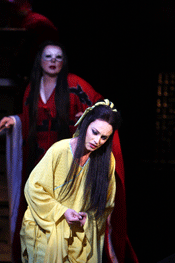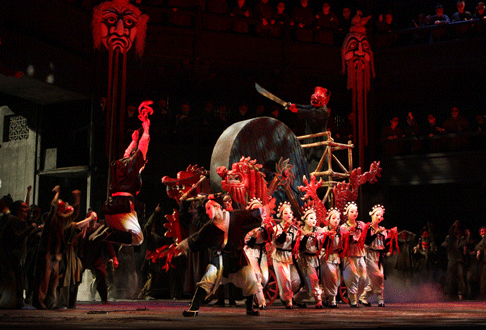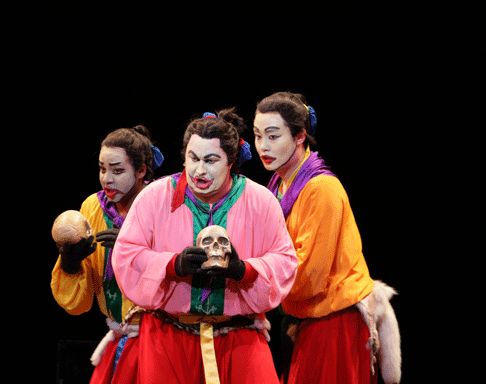![Dario Volonte as Calaf, Maria Guleghina as Turandot [Photo by Karin Cooper courtesy of Washington National Opera]](http://www.operatoday.com/Dario-Volonte-as-Calaf%2C-Mar.gif)
17 May 2009
Turandot — Washington National Opera
Bringing Andrei Şerban’s Turandot to the Washington National Opera as a season finale really means finishing the year with a bang.
English Touring Opera are delighted to announce a season of lyric monodramas to tour nationally from October to December. The season features music for solo singer and piano by Argento, Britten, Tippett and Shostakovich with a bold and inventive approach to making opera during social distancing.
This tenth of ten Live from London concerts was in fact a recorded live performance from California. It was no less enjoyable for that, and it was also uplifting to learn that this wasn’t in fact the ‘last’ LfL event that we will be able to enjoy, courtesy of VOCES8 and their fellow vocal ensembles (more below …).
Ever since Wigmore Hall announced their superb series of autumn concerts, all streamed live and available free of charge, I’d been looking forward to this song recital by Ian Bostridge and Imogen Cooper.
The Sixteen continues its exploration of Henry Purcell’s Welcome Songs for Charles II. As with Robert King’s pioneering Purcell series begun over thirty years ago for Hyperion, Harry Christophers is recording two Welcome Songs per disc.
Although Stile Antico’s programme article for their Live from London recital introduced their selection from the many treasures of the English Renaissance in the context of the theological debates and upheavals of the Tudor and Elizabethan years, their performance was more evocative of private chamber music than of public liturgy.
In February this year, Albanian soprano Ermonela Jaho made a highly lauded debut recital at Wigmore Hall - a concert which both celebrated Opera Rara’s 50th anniversary and honoured the career of the Italian soprano Rosina Storchio (1872-1945), the star of verismo who created the title roles in Leoncavallo’s La bohème and Zazà, Mascagni’s Lodoletta and Puccini’s Madama Butterfly.
Evidently, face masks don’t stifle appreciative “Bravo!”s. And, reducing audience numbers doesn’t lower the volume of such acclamations. For, the audience at Wigmore Hall gave soprano Elizabeth Llewellyn and pianist Simon Lepper a greatly deserved warm reception and hearty response following this lunchtime recital of late-Romantic song.
Collapsology. Or, perhaps we should use the French word ‘Collapsologie’ because this is a transdisciplinary idea pretty much advocated by a series of French theorists - and apparently, mostly French theorists. It in essence focuses on the imminent collapse of modern society and all its layers - a series of escalating crises on a global scale: environmental, economic, geopolitical, governmental; the list is extensive.
For this week’s Live from London vocal recital we moved from the home of VOCES8, St Anne and St Agnes in the City of London, to Kings Place, where The Sixteen - who have been associate artists at the venue for some time - presented a programme of music and words bound together by the theme of ‘reflection’.
'Such is your divine Disposation that both you excellently understand, and royally entertaine the Exercise of Musicke.’
Amongst an avalanche of new Mahler recordings appearing at the moment (Das Lied von der Erde seems to be the most favoured, with three) this 1991 Mahler Second from the 2nd Kassel MahlerFest is one of the more interesting releases.
‘And there was war in heaven: Michael and his angels fought against the dragon; and the dragon fought and his angels, And prevailed not; neither was their place found any more in heaven … that old serpent … Satan, which deceiveth the whole world: he was cast out into the earth, and his angels were cast out with him.’
If there is one myth, it seems believed by some people today, that probably needs shattering it is that post-war recordings or performances of Wagner operas were always of exceptional quality. This 1949 Hamburg Tristan und Isolde is one of those recordings - though quite who is to blame for its many problems takes quite some unearthing.
There was never any doubt that the fifth of the twelve Met Stars Live in Concert broadcasts was going to be a palpably intense and vivid event, as well as a musically stunning and theatrically enervating experience.
‘Love’ was the theme for this Live from London performance by Apollo5. Given the complexity and diversity of that human emotion, and Apollo5’s reputation for versatility and diverse repertoire, ranging from Renaissance choral music to jazz, from contemporary classical works to popular song, it was no surprise that their programme spanned 500 years and several musical styles.
The Academy of St Martin in the Fields have titled their autumn series of eight concerts - which are taking place at 5pm and 7.30pm on two Saturdays each month at their home venue in Trafalgar Square, and being filmed for streaming the following Thursday - ‘re:connect’.
The London Symphony Orchestra opened their Autumn 2020 season with a homage to Oliver Knussen, who died at the age of 66 in July 2018. The programme traced a national musical lineage through the twentieth century, from Britten to Knussen, on to Mark-Anthony Turnage, and entwining the LSO and Rattle too.
With the Live from London digital vocal festival entering the second half of the series, the festival’s host, VOCES8, returned to their home at St Annes and St Agnes in the City of London to present a sequence of ‘Choral Dances’ - vocal music inspired by dance, embracing diverse genres from the Renaissance madrigal to swing jazz.
Just a few unison string wriggles from the opening of Mozart’s overture to Le nozze di Figaro are enough to make any opera-lover perch on the edge of their seat, in excited anticipation of the drama in music to come, so there could be no other curtain-raiser for this Gala Concert at the Royal Opera House, the latest instalment from ‘their House’ to ‘our houses’.
"Before the ending of the day, creator of all things, we pray that, with your accustomed mercy, you may watch over us."
![Dario Volonte as Calaf, Maria Guleghina as Turandot [Photo by Karin Cooper courtesy of Washington National Opera]](http://www.operatoday.com/Dario-Volonte-as-Calaf%2C-Mar.gif)
Bringing Andrei Şerban’s Turandot to the Washington National Opera as a season finale really means finishing the year with a bang.
Created by the Royal Opera House in 1984, with the current WNO director Placido Domingo as Calaf and Gwyneth Jones in the title role, the production has since been revived there fifteen times, staged over fifty times by opera houses around the world, and celebrates its 25th season this year. With all due respect to the original cast, this unprecedented success has nothing to do with them, but rather with the interpretive genius of the director Andrei Şerban, and the fantastic inventiveness of the set and costume designer Sally Jacobs, whose original ideas were presented last night at the WNO stage.
Şerban’s Turandot is staged: literally staged, as the opera is played out in a traditional Chinese theater, with the chorus occupying the galleries as it comments and participates in the action. The theater is decorated by gigantic masks, representing the heads of Turandot’s slain suitors. The characters are also masked (most also wear a white-face make-up, creating a mask-over-mask effect), their gestures deliberate and stylized. The colors are vibrant, with the crimson reds dominating. The emperor’s golden throne, lowered from the ceiling to hover above the crowd in Acts 2 and 3, is a striking effect, and the sword-wielding female dancers in white masks are so chilling, they are downright creepy.
 Sabina Cvilak (fore) as Liu, Maria Guleghina (back) as Turandot
Sabina Cvilak (fore) as Liu, Maria Guleghina (back) as Turandot
The opening night was the usual spectacle of tuxes and gowns. My husband
really liked the live Terracotta Warrior in the lobby; I thought it was,
perhaps, a tad over the top. There were inevitable first-night kinks; and no,
I am not talking about an unidentified heavy object crashing backstage
half-way through Turandot’s opening aria, which all those present have
been determined to forget. The kinks concerned the issues of balance and
timing, as the conductor Keri-Lynn Wilson tried to keep various sections of
the large orchestra, chorus, and soloists in a perfect synchronicity required
by Puccini’s famously complex score. The first act in particular
occasionally felt like a gigantic house of cards, shaking slightly, just on
the verge of collapse. Thankfully, it never quite did, and as the performance
progressed, the tremors mostly subsided, save for only an occasional
aftershock.
Argentine tenor Dario Volonté as Calaf hit every note; he demonstrated the fiery metallic timbre, and the alternatively aggressive and brooding personality essential for his character. Yet, his voice had no lyricism, no warmth, and most importantly, no sustaining power — at least not last night — that would have allowed the listener time to appreciate all those head-spinning highs before they sputtered and died like wet Chinese fireworks. His Act 3 pièce de resistance, “Nessun dorma”, was so rushed that the orchestra had trouble keeping up. There was no cantilena, no luxurious lingering on the final “Vincero!”, and consequently, Turandot’s most glorious moment and one of Puccini’s best-known tunes, probably for the first time in its history, evaporated without even a smattering of applause.
 Scene from Act I
Scene from Act I
The first applause of the night belonged to Slovenian soprano Sabina Cvilak as Liù, and deservedly so. Her tiny, brittle figure, dwarfed by the scenery and the other characters, was an embodiment of Puccini’s fragile, tragic heroine, the most human character in Turandot (in a stroke of directorial inventiveness, Liù is never masked). And the vocal interpretation was spot-on: pure, crystalline highs; easy, unforced delivery; power to soar above the orchestra at will, but exercised sparingly, in preference to the heart-breaking pianissimo that somehow, miraculously, was perfectly audible (kudos here also to Ms Wilson for her sensitive conducting).
There could have been no greater contrast between Ms Cvilak’s Liù and Princess Turandot as presented by celebrated Russian dramatic soprano Maria Guleghina. Here, everything was the opposite: tall, imposing figure; stylized kabuki gestures; earth-shattering power of the voice that waited until the opera’s finale to drop below fortissimo and was meanwhile so intimidating, one barely noticed that it was almost impossible to discern the words that came out of Ms Guleghina’s mouth. Like the “citizens of Peking,” we simply submitted to the iron will of the Daughter of Heaven, and waited for precise instructions from her Mandarin.
 Norman Shankle, Nathan Herfindal, Yingxi Zhang as Ping, Pang and Pong
Norman Shankle, Nathan Herfindal, Yingxi Zhang as Ping, Pang and Pong
The Mandarin, Ukrainian Okeskandr Pushniak, was acceptable if not at all intimidating in his tiny part, and was much more interesting to look at than to hear, clad as he was in one of Sally Jacobs’ fabulously colorful creations. Much better — a highlight of the evening, in fact — were Ping, Pang, and Pong (Nathan Herfindahl, Norman Shankle, and Yingxi Zhang, respectively), who garnered accolades for their nice comic timing, and delivering strong vocal performances while endlessly moving, dancing, and literally doing cartwheels around the stage. Indeed, the choreography created by Kate Flatt for their parts and throughout Turandot proved to be one of the strongest elements of the production. Particularly interesting was the fluid continuity of stylized gestures and movements that all performers shared. Blurring the boundaries between the soloists, the chorus, and the dancers, the technique delivered a stunningly unified visual effect.
This unity was clearly the stage director’s goal, realized with the support of Jacobs’ designs, Flatt’s choreography, and F. Mitchell Dana’s lighting. For this alone, it is worth seeing Andrei Şerban’s magnificent interpretation of the Puccini classic — now, at 25, a classic in its own right.
Olga Haldey